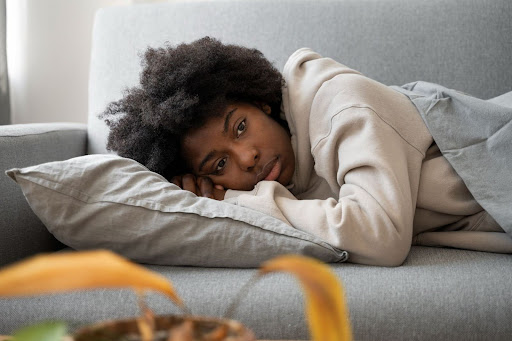Are Sleep Efforts Worsening Insomnia? 5 Expert Solutions!

Have you ever found yourself lying awake at night, desperately willing your mind to shut off and your body to relax?
As the hours tick by, your frustration grows, and you become increasingly anxious about not being able to fall asleep. This scenario is all too familiar for those struggling with insomnia. Paradoxically, the more effort you put into trying to sleep, the more elusive it becomes.
In this article, we’ll explore why trying harder to sleep often backfires and exacerbates insomnia. More importantly, we’ll discuss effective strategies recommended by sleep therapists to help you break free from this cycle and find your way back to restful nights!
The Paradox of Effort in Sleep
When it comes to sleep, more effort doesn’t equal better results. In fact, trying harder to sleep often leads to increased wakefulness and frustration. This phenomenon is rooted in the nature of sleep itself – it’s a passive process that cannot be forced or controlled directly.
Sleep is a delicate biological process governed by complex neurochemical interactions and circadian rhythms. Unlike other bodily functions we can consciously control, such as breathing or muscle movement, sleep requires a state of relaxation and disengagement from conscious effort. The act of trying to sleep activates our conscious mind, which can interfere with the natural wind-down process our brains need to transition into sleep.
This paradox is similar to trying to relax by tensing all your muscles – the very act of exertion prevents the desired outcome. For sleep to occur naturally, we need to create conditions that allow our body and mind to ease into a restful state, rather than actively pursuing sleep as a goal to be achieved through sheer willpower.
Read more about overcoming insomnia-related awakenings in this post.
Why Effort Backfires?
1. Increased Arousal: Actively trying to sleep activates your sympathetic nervous system, the body’s “fight or flight” response. This heightened state of alertness is counterproductive to the relaxation needed for sleep.
2. Performance Anxiety: The pressure to fall asleep can create anxiety, especially if you’ve experienced sleepless nights before. This anxiety further increases arousal and makes sleep more difficult.
3. Disrupted Sleep-Wake Cycle: Spending excessive time in bed trying to sleep can disrupt your natural sleep-wake rhythm, making it harder to fall asleep at the desired time.
The Impact of Sleeplessness
Many people wonder, “Why can’t I sleep at night even when I’m tired?” This frustrating experience can have various causes and significant impacts on daily life.
Short-term Effects
- Fatigue and irritability
- Difficulty concentrating
- Increased stress and anxiety
Long-term Consequences
- Weakened immune system
- Increased risk of mental health issues
- Potential development of chronic insomnia
Common Causes of Sleep Difficulties
Understanding the root causes of sleep problems is crucial for finding effective solutions. Here are some common factors that contribute to sleeplessness:
Lifestyle Factors
- Irregular sleep schedule
- Excessive caffeine or alcohol consumption
- Late-night screen time
Psychological Factors
- Stress and anxiety
- Depression
- Racing thoughts
Physical Factors
- Chronic pain
Click here to understand the complex relationship between sleep and chronic pain.
- Hormonal changes (especially relevant when considering causes of insomnia in females)
- Certain medications

Breaking the Cycle: What to Do Instead
Instead of trying harder to sleep, sleep therapy focuses on creating the right conditions for sleep to occur naturally. Here are some effective strategies:
1. Practice Sleep Restriction
Sleep restriction involves limiting time in bed to match your actual sleep time. This method helps consolidate sleep and strengthen your natural sleep drive. By initially reducing time in bed, you create a mild sleep deprivation that increases sleep pressure. As sleep efficiency improves, the sleep window is gradually extended. This technique can be challenging at first but often leads to more consistent, restorative sleep patterns over time.
2. Implement Stimulus Control
This technique aims to rebuild the association between your bed and sleep. Key principles include:
- Only going to bed when sleepy, not just tired
- Using the bed only for sleep and intimacy, avoiding activities like reading, watching TV, or working
- Leaving the bedroom if you can’t sleep within 20-30 minutes, returning only when sleepy
These rules help recondition your brain to associate your bed with sleep, not wakefulness or frustration. Over time, this strengthens the bed-sleep connection, making it easier to fall asleep when you lie down.
3. Cognitive Restructuring
Work on identifying and challenging unhelpful thoughts about sleep. For example, replace “I’ll be a wreck tomorrow if I don’t sleep now” with “I can still function even with less sleep.” This technique helps reduce anxiety about sleep, which often perpetuates insomnia. By adopting more balanced, realistic thoughts about sleep, you can lower the mental arousal that interferes with falling asleep.
4. Relaxation Techniques
Incorporate relaxation methods like deep breathing, progressive muscle relaxation, or mindfulness meditation into your bedtime routine. These practices help activate the parasympathetic nervous system, promoting a state of relaxation conducive to sleep. Regular practice can make it easier to shift into a restful state when it’s time for bed.
5. Improve Sleep Hygiene
Enhance your sleep environment and habits:
- Keep a consistent sleep schedule, even on weekends, to regulate your body’s internal clock
- Create a dark, quiet, and cool bedroom environment to support your body’s natural sleep processes
- Limit screen time before bed, as blue light can interfere with melatonin production
- Avoid heavy meals close to bedtime, which can cause discomfort and disrupt sleep
Good sleep hygiene creates an optimal environment for sleep, both in terms of your physical space and your daily habits. While it may not cure chronic insomnia on its own, it provides a foundation for other sleep interventions to work more effectively.
Addressing Specific Concerns
When You Lay in Bed for Hours and Can’t Sleep
If you find yourself unable to sleep after 20-30 minutes, don’t stay in bed tossing and turning. Instead:
- Get up and go to another room
- Engage in a calm, non-stimulating activity (like reading a book)
- Return to bed only when you feel sleepy
Sudden Trouble Sleeping at Night
If you’re wondering, “Why am I having trouble sleeping at night all of a sudden?” consider recent changes in your life:
- New stressors
- Changes in diet or exercise
- New medications
Consult with a sleep therapist or healthcare provider if the problem persists.
Chronic Insomnia: When Sleep Problems Persist
Chronic insomnia refers to sleep difficulties occurring at least three nights a week for three months or more. It often requires a comprehensive approach, including:
- Cognitive Behavioral Therapy for Insomnia (CBT-I)
- Lifestyle modifications
- Addressing underlying health conditions
The Myth of Quick Fixes
While you might come across claims like “How to cure insomnia in 12 minutes,” it’s important to approach such promises with skepticism. Sustainable improvements in sleep typically require patience, consistency, and often professional guidance.
When to Seek Professional Help
Consider consulting a sleep therapist if:
- Your sleep problems persist for more than a few weeks
- Insomnia is significantly impacting your daily life
- You’re relying on sleep aids (including over-the-counter medications) regularly
A sleep therapist can provide personalized strategies and support to address your specific sleep challenges.
Conclusion
The journey to better sleep isn’t about trying harder – it’s about creating the right conditions for sleep to happen naturally. By understanding the paradox of effort in sleep and implementing evidence-based strategies, you can break free from the cycle of sleepless nights. Remember, everyone’s sleep needs are unique, and what works for one person may not work for another. Be patient with yourself as you explore different approaches.
If you continue to struggle with sleep, don’t hesitate to seek professional help. A sleep therapist can provide personalized guidance and support. With the right approach and mindset, restful nights are within reach. Sweet dreams await – not through force, but through gentle, consistent care for your sleep health.
